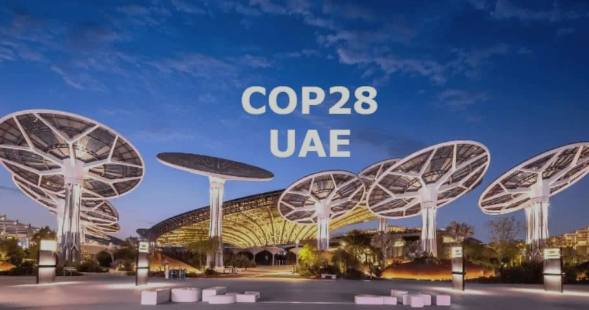Nearly 200 nations reached a consensus on Thursday to launch a fund aimed at supporting countries affected by the impacts of global warming, marking a “historic” milestone as UN climate talks kicked off in the oil-rich UAE. The announcement aligned with the Emirati hosts of COP28, highlighting the integral role of fossil fuels in any climate agreement negotiated over the next two weeks.
These discussions in Dubai unfold at a critical juncture for the planet, with emissions continuing their upward trajectory. On Thursday, the UN declared that 2023 is on track to become the hottest year in human history.
The formal establishment of the “loss and damage” fund, a longstanding demand of climate-vulnerable nations, represented an early triumph at COP28, where clear divisions on the phasing out of fossil fuels underscored the challenges ahead.

“We have made history today,” proclaimed COP28 president Sultan Al Jaber, as delegates embraced and cheered. Jaber emphasized, “This is the first time a decision has been adopted on day one of any COP, and the speed at which we have done so is also unique, phenomenal, and historic. This is evidence that we can deliver. COP28 can and will deliver.”
Leaders are under increasing pressure to accelerate the shift towards a clean energy future and implement more robust emissions reductions, given the world’s deviation from agreed-upon targets for limiting global temperature increases.
A pivotal component of COP28 will be a thorough assessment of the world’s limited progress in mitigating global warming, necessitating an official response during these discussions.

With a doubling in size from last year’s COP27, this conference is heralded as the largest ever, anticipating the participation of 97,000 individuals, including Britain’s King Charles III and approximately 180 other heads of state and government.
Both the UN and the UAE, acting as hosts, assert that these talks will be the most critical since the Paris Agreement in 2015, with climate finance for economically disadvantaged nations holding significant importance on the agenda.
Positioning itself as a mediator between affluent developed nations, primarily responsible for historical emissions, and the rest of the world, which has made a lesser contribution to global warming but faces its most severe consequences, the UAE assumes a crucial role in the climate dialogue.

Promptly, the UAE and Germany declared contributions of $100 million each towards the loss and damage fund, with the European Union following suit with $246 million. While additional pledges are expected in the days ahead, they fall significantly short of the $100 billion that developing nations assert is necessary.
“The progress in establishing a loss and damage fund is immensely significant for climate justice, but an empty fund can’t assist our people,” cautioned Madeleine Diouf Sarr, chair of the Group of the 46 Least Developed Countries.
At 50 years old, Jaber takes on the roles of both COP president and head of the UAE’s national oil giant, raising concerns about a potential conflict of interest, especially amid calls for negotiations on the phasedown of fossil fuels in Dubai.

On the eve of COP, Jaber found himself compelled to refute accusations, initially reported by the BBC, that he leveraged the COP presidency to pursue new fossil fuel
During his opening address, Jaber stressed to delegates the imperative need to “ensure the inclusion of the role of fossil fuels” in any final climate agreement, commending oil companies for their active participation in the discussions.
“They can lead the way. And then leading the way will ensure that others follow and catch up,” he asserted.
However, UN climate chief Simon Stiell presented a contrasting perspective to the gathering, stating, “If we do not signal the terminal decline of the fossil fuel era as we know it, we welcome our own terminal decline.”

Reaching a consensus on the future of fossil fuels proves challenging at COP, where unanimous decisions are required from nations, regardless of their reliance on oil, vulnerability to rising seas, or geopolitical tensions.
The UAE aims to secure an agreement for tripling renewable energy and doubling annual energy efficiency improvements by 2030.
From November 30 to December 12, nations will grapple with various complex issues, with experts highlighting the considerable challenge of building trust.

During the conference’s opening, delegates observed a minute of silence for civilians affected by the Gaza conflict. Additionally, Israeli President Isaac Herzog will engage in discussions with diplomats on the release of hostages held by Hamas on the sidelines.
Notably, neither US President Joe Biden nor Chinese President Xi Jinping is attending, though Vice-President Kamala Harris will represent the United States.

However, the world’s two largest polluters, the US and China, made a noteworthy joint announcement on climate earlier this month, injecting a sense of optimism as COP28 commenced.
